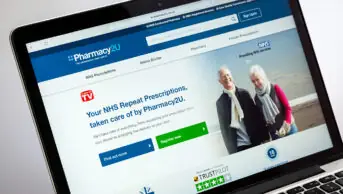
General Pharmaceutical Council
Nearly a quarter of online pharmacies that have been inspected by the General Pharmaceutical Council (GPhC) were found to be supplying medicines to patients without their GP knowing.
One online pharmacy that failed its inspection — UK Meds Direct — told The Pharmaceutical Journal that it must allow patients to opt out of informing their GP in order to comply with EU data protection laws.
However, GPhC guidance for online pharmacies requires prescribers to make a clear record of their justification for prescribing in cases where this consent is not given.
An analysis by The Pharmaceutical Journal of pharmacy inspection reports found that 18 of the 45 online pharmacies that have had their inspection reports published on the GPhC’s website failed to meet all of the standards required.
Of these, 11 online pharmacies were identified as supplying medicines without informing the patient’s doctor and ensuring that they agreed to the supply. In 6 cases, the medicines being supplied were specified as ‘high risk’.
The analysis comes after a Suffolk coroner wrote to Matt Hancock, health and social care secretary, following an inquest into the death of Debbie Headspeath, who purchased large quantities of codeine online without her GP being informed.
UK Meds Direct, a Nottingham-based online pharmacy, was 1 of 16 online pharmacies from which Headspeath purchased codeine in the six months prior to her death in 2017.
Its GPhC inspection report found that the pharmacy was not ensuring its prescribers were contacting patients’ GPs in advance of issuing a prescription and, where consent had not been given, prescribers were not clearly recording their justification for prescribing.
“The pharmacy does not make sure that prescribers contact people’s GPs in advance of issuing a prescription. And when the person has not given consent for their GP to be contacted, prescribers are not making a clear record explaining their justification for prescribing.
“This is a risk because people’s conditions and their use of medicines might not be properly monitored and managed,” the report said.
A spokesperson for UK Meds Direct said that, where a patient had provided their consent for their GP to be contacted, it considered that it had complied with the GPhC’s requirement to do so.
“The issue of concern appears to arise if the patient doesn’t provide their consent for their GP — or regular prescriber — to be contacted,” the spokesperson said, adding that it had “sought to comply with the [GPhC] guidance since it was published”.
They added that the pharmacy “asks patients for their consent to share medical information with their GP in order to comply with the requirements of Data Protection Act 2018”.
Duncan Rudkin, chief executive of the GPhC, said: “Failure to follow the guidance would be evidence that the pharmacy is not meeting our standards and enforcement action may be taken.”
Rudkin added that the GPhC had taken “enforcement action” against online pharmacies which have supplied high-risk medicines to patients inappropriately.
“In most of these cases, we have imposed conditions restricting the sale or supply of opioids and other controlled drugs by the pharmacy,” he said, adding that the regulator has also referred “a number of individual pharmacy professionals” to its fitness-to-practise process.
The Pharmaceutical Journal also contacted several of the other online pharmacies that failed the GPhC inspection, including FCL Chemist, Homecare Pharmacy, Nationwide Pharmacies and Prime Pharmacy; however, none of them responded to the request to comment.


